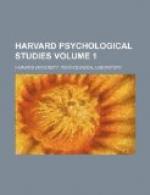2. The influence of falling water as an auditory stimulus. Water was allowed to fall about two feet in imitation, first, of a plunging frog, and second, of water falling over rocks. In representing the effect of the stimulus on the rate of respiration, I have given the distance on the drum covered by the ten complete respirations just preceding the stimulus and the ten following it.
10 Respirations.
10 Respirations.
Before Stimulus. After Stimulus.
1st Stim. 13.0 cm. 11.8 cm.
2d Stim. 12.7 cm. 12.7 cm.
With a smaller animal.
1st Stim. 5.4 cm. 4.8 cm. 2d Stim. 4.9 cm. 4.7 cm. Average for 5 5.00 cm. 4.86 cm.
These records show a marked increase in the rate of respiration just after the auditory stimulus is given for the first time. The stimulus has less effect when repeated after an interval of one or two minutes, and if repeated several times it finally causes no noticeable change. On the whole, the sound of falling water seems to arouse the animals to fuller life. The stimulus appears to interest them, and it certainly accelerates respiration. This is precisely what one would expect from a sound which is of special significance in the life of the animal.
3. In case of a loud shrill whistle inhibition of respiration resulted. This probably means that the frogs were frightened by the sound. Falling water served rather to excite their natural-habitat associations, whereas, the whistle, being an uncommon and unassociated sound, caused fear. It is evident to the casual observer that the frog sometimes inhibits and sometimes increases its respiratory movements when frightened, so the result in this experiment is in no way surprising. I am by no means certain, however, that a longer series of observations on several individuals would give constant inhibitory results. My immediate purpose in the work was to get evidence of hearing; the respiratory changes were of secondary importance, although of such great interest that I have planned a more thorough special study of them for the future.
A few sample results showing the influence of the whistle upon a small bull-frog follow:
Length of 10 Resps.
Length of 10 Resps.
Before Stimulus in cm. After
Stimulus in cm.
1st Stim. 6.0
6.7
2d " 5.4
6.0
3d " 5.9
5.8
1st " 4.7
5.4
2d " 4.4
4.6
As a test-check observation for comparison, the influence of a visual stimulus upon respiration was noted under the same conditions as for the auditory. Effect of turning on electric light over box.




